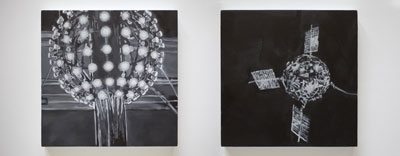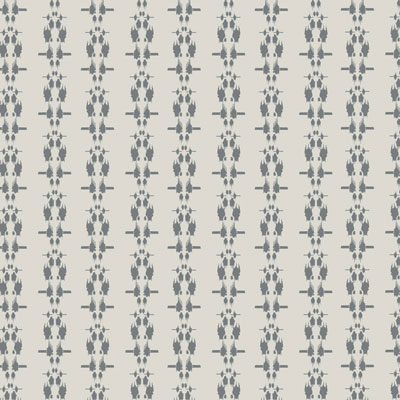Eirene Efstathiou: No Direction Home + Bennett Morris: Part Seen Imagined Part
 |
 |
| Eirene Efstathiou: "The subject or organizing principle of these archives is intentionally oblique: I searched for images of thresholds between public and private space, demarcations of territory, separation barriers, and unintentional sites of memory and history." |
 |
| Bennett Morris: "We now inhabit this state of ruination. Not just physical ruin, but the very ruination of perception. This is a simulated reality where time, distance, and scale all break down and dissolve through the perpetual invasiveness of technology. I propose that within any acknowledgment of the ruined as a story of the past lies a forecast of a potential future. My practice is a portal that re-posits the sublime within this projection." |
Eirene Efstathiou's works take the form of small paintings that move across walls in groups, like reels or storyboards. The paintings depict moments crisply caught with the excellent kind of painting that is highly convincing at a distance but dissolves into blobs at close range. The result is a simulation of glitches both technological (pixilation, blurriness, over- exposure) and human (apathy, impatience, boredom). Shifts in perspective and the sometimes skewed focus on highly detailed scenes destabilize the read of these paintings as reproductions of photos. Additionally the start and stop rhythms of action, space, and distance ignite a deeper examination. We begin to look harder and more critically, associating self-consciously. What would be a sentimental moment is subverted by shifted framing. The negative space at the edge of a reel or projection defrays immediate understanding or satisfaction. Our sense of memory is halted; our longing increases and a commentary develops.
This work inhabits the intermediary zone between reality and the perpetual performance of reality in culture and memory. Efstathiou creates a peripheral viewpoint that forces a removal, giving us awareness of the frequency and magnitude of cultural and societal detachment. Events, crowds, faces, and buildings are aligned with quiet views of peripheral interiors places. A bathroom sign and the space above a door, rendered in color, acts as an instant of personal reflection that re-alerts us to our partisan participation in these disengaged moments. A constant dialog between passive assimilation and intense self and cultural criticality, Efsathiou's work brings up ruminations on the auto -biographical appropriation of history and the marginal existence of a public consciousness. Narratives coagulate in which the whole history of the last one hundred years is implicated, and all our collected childhoods interact with the deliberate flow of society, politics, and time.
Futurist thinkers, science fiction geeks, and technophiles debate where our heady love affair with biomechanical "life forms" will leave us. Transhumanists believe that technological advances in bioengineering, genetic modification, nanotechnology and robotics will combat all that is abject in the human condition. Others argue that life and humanity will be indelibly altered with terrifying and apocalyptic consequences.
This discussion is an on-going theme in Bennett Morris' work. This September at Whitney Art Works he presents a series of silkscreen prints like pattern swatches, a large-scale photograph, and what he describes as landscape/tunnel books. The mix of spectral images of ruinous atmospheres, candy-colored but vaguely threatening patterns, and vivid, three-dimensional objects, gives a holographic effect to his particularly decorative investigation of failure. His patterns are made out of blob-like shapes that are familiar and ominous, like small drones, tumors, dark stains, or specimens. Some are biomechanical surveillance structures floating in a still, post-human world or wallpapering space like inert armies. His position rides the line between a transhumanist celebration of the resilience and beauty of this human-less future and a disturbing sense of isolation and mourning. By approaching these themes from an increasingly ornamental aesthetic Morris further explores the ambivalence and delight in abandoning our own senses of perception and reality as we careen towards this human-less age. Morris uses the idea of sublime as the philosopher Immanuel Kant used it. The inability to grasp the indefinite and enormous nature of something results in a formless beauty and the trepidatious end of reason. Morris' work is driven by this awe at the magnificent lack of purpose in the technologically commandeered future where what remains is alert but rendered moot.
-Celeste Parke
Eirene Efstathiou is a native of Athens, Greece where she lives and works. Her work was included in the Portland Museum Biennial of Art in 2007 and in the exhibition Selective Knowledge at the ITYS Institute for Contemporary Art and Thought in Athens. Most recently she was short-listed for the 2009 DESTE Prize, a prestigious prize for Greek artists awarded by the DESTE Foundation for Contemporary Art. Efstathiou studied at the School of the Museum of Fine Arts and at Tufts University where she completed her BFA in 2003. She is currently working on a graduate degree at the Athens School of Fine Arts.
Bennett Morris received a MFA from Maine College of Art in 2007 and attended the Skowhegan School of Painting and Sculpture with a Fellowship that same year. His work has been exhibited throughout the United States in Philadelphia, Seattle and in numerous locations in Maine. Recent exhibitions in 2009 include Twilight at the Institute of Contemporary Art in Portland, Maine, and a video installation at Electronic 4 Culture in Seattle, Washington. He serves as faculty at both Saint Joseph's College of Maine and at the Maine College of Art.
Eriene Efstathiou + Bennett Morris will be on view at Whitney Art Works from September 2 - 26, 2009. A reception will be held on First Friday, September, 4 from 5 - 8 pm.
Whitney Art Works is open Wednesday - Saturday from 12 - 6 pm or by appointment.
© Whitney Art Works, All Rights Reserved. 45 York Street, Portland, Maine 04101 Voice: 207-780-0700
You are viewing the printer-friendly version of Eirene Efstathiou: No Direction Home + Bennett Morris: Part Seen Imagined Part